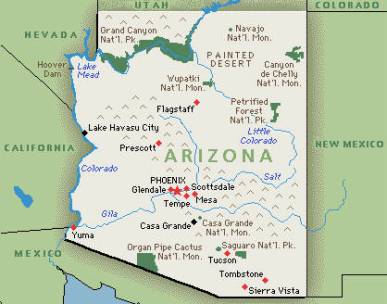
Peace Corps Fellows Jill Brinkman and Scott Ralston work on Apache Indian Reservation
Students give and learn lessons on the Reservation
by Sonia Bowers
February 12, 2004
Row by vivacious row, NAU elementary education graduate student Jill Brinkman dismisses her fifth grade class to the glitter-encrusted hallway before heading toward the lunchroom.
Brinkman, who volunteered two years in the Peace Corps in Namibia, is currently working toward a master's degree and teaching certificate by instructing classes in English and math at Cradleboard Elementary School in Whiteriver on the Apache Indian Reservation.
Brinkman, along with 20 other returned Peace Corps volunteers turned NAU students, are presently student teaching throughout the Navajo, Apache and Hopi reservations through the Peace Corps Fellows Program.
The program is administered through the Center for Excellence in Education.
"The program is unique and efficient because it combines learning and the first-hand experience of teaching in a two-year time frame," Buckreis said.
The school district pays half tuition and a stipend of about $1,800 a month to the graduate student teachers, who instruct reading, writing and math at the dome-shaped school.
Scott Ralston, who spent two years in Mongolia through the Peace Corps, has been teaching at Cradleboard since September 2003 and said he feels a connection with his students' minds.
His fourth grade classroom is filled with grade school goods: cursive charts, messy stacks of books, student drawings and crafts. The children shuffle about, energetically drawing, sharpening pencils, and socializing simultaneously as Ralston reads them a chapter of "Harry Potter and the Order of the Phoenix."
"The hardest thing is trying to teach structure to kids and not having much structure myself," Ralston said. "My tangents have tangents."
Ralston said many of his pupils have unstable home lifes, live in poverty and move around from home to home.
"I know I (may be) the only structure in their lives so I just try to talk to them and communicate," Ralston said. "I think the kids like coming to school to get away from (possible) problems at home."
Teaching on the reservation can be emotionally taxing for Ralston, he explained.
Overhearing stories of abuse, drugs and alcoholism cause him to question parents' motives and capabilities, but builds his passion for reaching his students, Ralston said.
Respecting students' ideas is how Ralston said he runs his classroom.
"Everything we do in my classroom is a democracy," Ralston said. "I let them vote on what they want to do and it shows them that their ideas are important."
Monique, Darilynn and Rochelle, three fourth graders, said they learn a lot from him because of his humor.
"I didn't want to write before but Mr. Ralston got me into it," Monique said. "I liked to read after him."
This is the kind of positive feedback driving Ralston's passion to teach.
"These kids are so much fun," Ralston said. "My favorite thing is just coming in, hanging out and talking."
Both Ralston and Brinkman agree that teaching on the reservation takes extra effort to build trusting relationships with students, but it is ultimately a rewarding experience.
Brinkman said her first year at Whiteriver has taught her a lot about teaching.
"I am learning a lot for the classroom, things I would do differently right away for next year," Brinkman said.
She also said teaching on the reservation is consuming, and it is hard to not get frustrated with students' bad behavior.
"On bad days I feel like going to school and student teaching would have been better," Brinkman said. "On other days I feel it is a good experience, like I have a life. The whole challenge of being in a strange but challenging setting is great."
